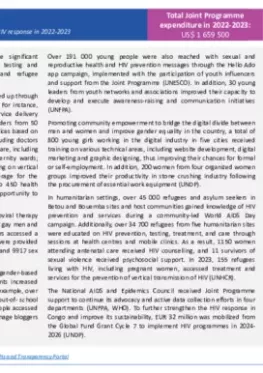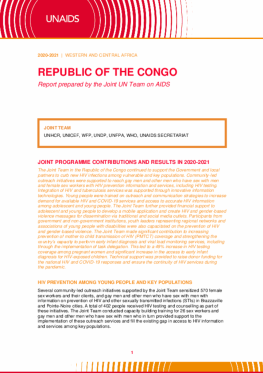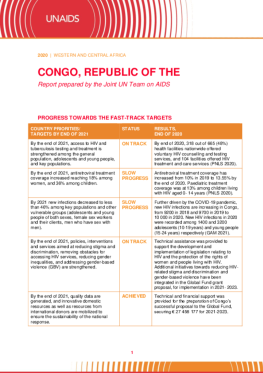|
Congo
In Congo, the Joint Programme in 2022-2023 made significant contributions in scaling up access to HIV prevention, testing and treatment services, especially among young people and refugee populations.
Prevention of vertical transmission of HIV services were scaled up through technical and financial support from the Joint Programme. For instance, 520 health workers improved their capacity for HIV service delivery through three training programmes—150 healthcare providers from 50 primary health facilities have greater capacity to deliver services based on the task-shifting model; 350 healthcare professionals, including doctors and midwives built their capacity in maternal and neonatal care, including early infant diagnosis and treatment management in maternity wards; and 20 obstetrician-gynaecologists received refresher training on vertical transmission services. From 2021 to 2023, services coverage for the prevention of vertical transmission increased from 110 to 450 health facilities nationwide, offering 2979 pregnant women the opportunity to receive antiretroviral therapy (UNICEF, UNDP).
The Joint Programme’s support ensured access to antiretroviral therapy for 38 000 people living with HIV. In addition, a total of 3612 gay men and other men who have sex with men and 11 854 sex workers accessed a range of HIV prevention services, and HIV testing services were provided to 2958 gay men and other men who have sex with men and 9917 sex workers.
HIV prevention, sexual and reproductive health, and gender-based violence knowledge among in and out-of-school adolescents increased through campaigns supported by the Joint Programme. For example, over 76 000 adolescents were sensitized through in-school and out-of- school awareness activities, while 2940 adolescents and young people accessed similar information via social media, aided by 20 trained teenage bloggers (UNICEF, UNDP). Over 191 000 young people were also reached with sexual and reproductive health and HIV prevention messages through the Hello Ado app campaign, implemented with the participation of youth influencers and support from the Joint Programme (UNESCO). In addition, 30 young leaders from youth networks and associations improved their capacity to develop and execute awareness-raising and communication initiatives (UNFPA).
Promoting community empowerment to bridge the digital divide between men and women and improve gender equality in the country, a total of 800 young girls working in the digital industry in five cities received training on various technical areas, including website development, digital marketing and graphic designing, thus improving their chances for formal or self-employment. In addition, 200 women from four organized women groups improved their productivity in stone crushing industry following the procurement of essential work equipment (UNDP).
In humanitarian settings, over 45 000 refugees and asylum seekers in Betou and Bouemba sites and host communities gained knowledge of HIV prevention and services during a community-led World AIDS Day campaign. Additionally, over 34 700 refugees from five humanitarian sites were educated on HIV prevention, testing, treatment, and care through sessions at health centres and mobile clinics. As a result, 1150 women attending antenatal care received HIV counselling, and 11 survivors of sexual violence received psychosocial support. In 2023, 155 refugees living with HIV, including pregnant women, accessed treatment and services for the prevention of vertical transmission of HIV (UNHCR).
The National AIDS and Epidemics Council received Joint Programme support to continue its advocacy and active data collection efforts in four departments (UNFPA, WHO). To further strengthen the HIV response in Congo and improve its sustainability, EUR 32 million was mobilized from the Global Fund Grant Cycle 7 to implement HIV programmes in 2024-2026 (UNDP).




